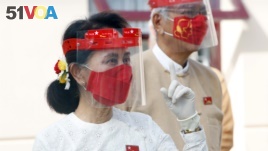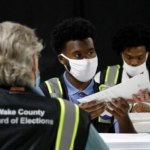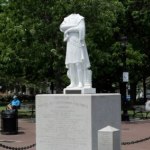12 October 2020
Myanmar's ruling National League for Democracy (NLD) party is widely expected to win the most votes in the country's November 8 general elections. However, political experts say it is less clear if it will win enough to keep its controlling majority in Parliament.
New and old rebellions, disenfranchised Rohingya and coronavirus-linked restrictions also are raising concerns about how credible the election will be.

Myanmar leader Aung San Suu Kyi gestures during a flag-raising ceremony to mark the first day of election campaigning at the National League for Democracy party's temporary headquarters in Naypyitaw, Myanmar on Sept. 8, 2020. (AP Photo/Aung Shine Oo)
'A very simplistic choice'
Pro-democracy leader Aung San Suu Kyi led the NLD to a historic landslide election win in 2015, defeating the military-backed Union Solidarity Development (USD) party. That NLD win led to reforms to replace the military rule of Myanmar, formerly Burma, to civilian rule.
The country's constitution bars Suu Kyi from seeking presidential office. However, with her ally Wyn Myint in that position, Suu Kyi is widely considered the country's leader.
Suu Kyi won the Nobel Peace Prize in 1991 and was widely celebrated for her battle to end military rule in Myanmar. However, she has lost much international support in recent years in connection with Myanmar's treatment of its ethnic Rohingya minority. At least 700,000 Rohingya fled the far-western state of Rakhine for Bangladesh beginning in August 2017. They were escaping Burma's military campaign against them, one the United Nations has recognized as genocidal
In Myanmar, Suu Kyi and her party remain very popular among the majority ethnic Bamar people. The NLD is seen as providing the best hope to remove the military from the government forever, said Khin Zaw Win. He is the director of the Tampadiba Institute, a Myanmar research group.
"So, it's a very simplistic choice and notion, saying that, OK, if you hate the military you have to support the NLD because that's the best chance," he said.
If it keeps most of the Bamar vote, "the NLD will still win a substantial number of seats, but it will not be a landslide," Khin Zaw Win said.
It will not be a landslide because many of Myanmar's ethnic minorities no longer back the NLD, experts say.
Minority rapport
Ethnic minorities make up more than 40 percent of the population. They strongly supported the NLD in the 2015 election. After years of hostilities between the military and ethnic rebel armies, many saw the possibility for peace with Suu Kyi and her party.
Instead, the last five years have been more like "a kick in the chest," said Khin Zaw Win.
Three-way peace talks between an alliance of ethnic armed groups, the military and Suu Kyi's government have made little progress.
In addition, a new front in the country's civil war opened up in northern Rakhine state. Tens of thousands of people have been displaced by fighting between the military and separatist Arakan Army. The Arakan Army wants more self-rule for the state's ethnic Rakhine.
Suu Kyi's government also began a campaign to build statues in honor of her father, Aung Sam, an ethnic Bamar independence hero. The decision to place those statues in areas with large minority populations caused protests and anger, said Ye Myo Hein. He is an expert with Myanmar's Tagaung Institute of Political Studies.
Many ethnic minorities now support smaller parties instead of the NLD. The NLD may lose its governing majority and be forced into a coalition government.
Free and fair
A recent sharp increase in COVID-19 cases is also raising the possibility that the government will postpone the vote, said Sai Ye Kyaw Swar Myint.
He runs Myanmar's largest independent voting observation and support organization, the People's Alliance for Credible Elections.
He said in a statement that the stay-at-home order to fight the coronavirus means candidates cannot go out and talk to voters. Meanwhile, the NLD controls state media.
He also said Myanmar's elections would not be truly free and fair until everyone who deserves citizenship, and the right to vote, gets it.
Myanmar cancelled Rohingya citizenship rights years ago. They can not vote, as a result. Rohingya presence in the area is believed to go back hundreds of years, however.
I'm Susan Shand.
VOA's Zsombor Peter reported this story. Susan Shand adapted it for Learning English. George Grow was the editor.
_
Words in This Story
disenfranchise– v. to take away one's right to vote
landslide – n. a very large victory for one side
notion– n. an idea
substantial– adj. given a lot of weight or power











